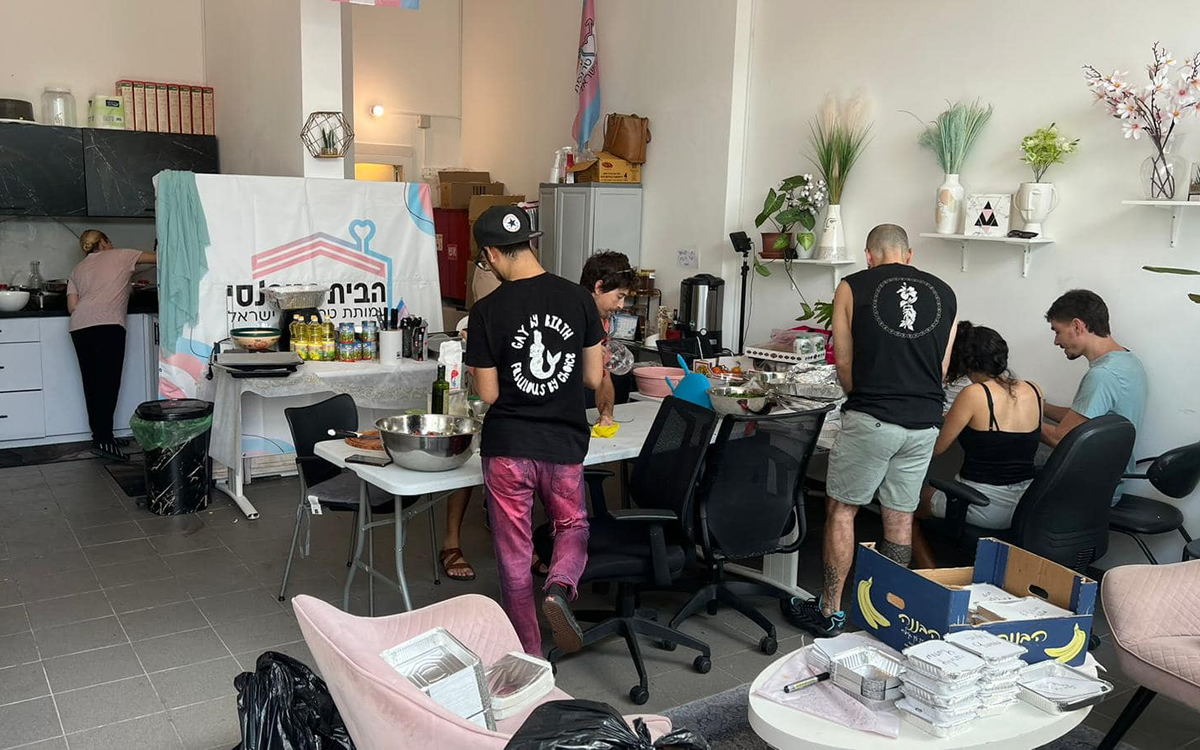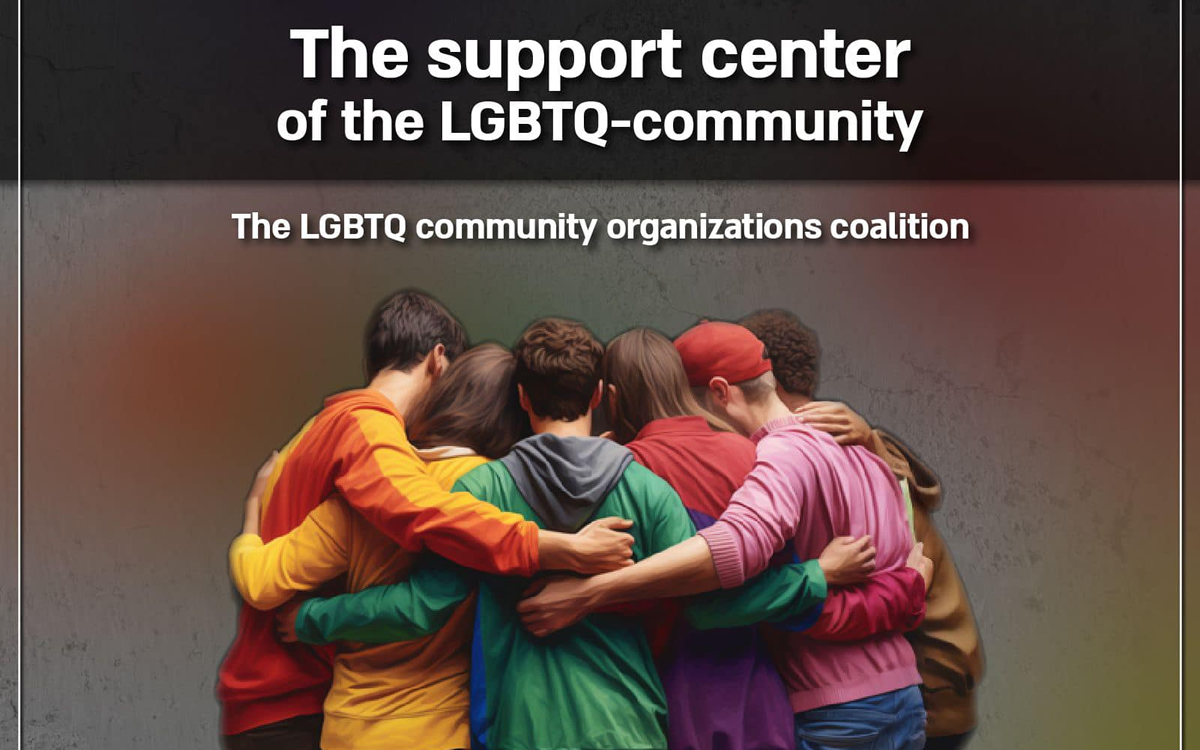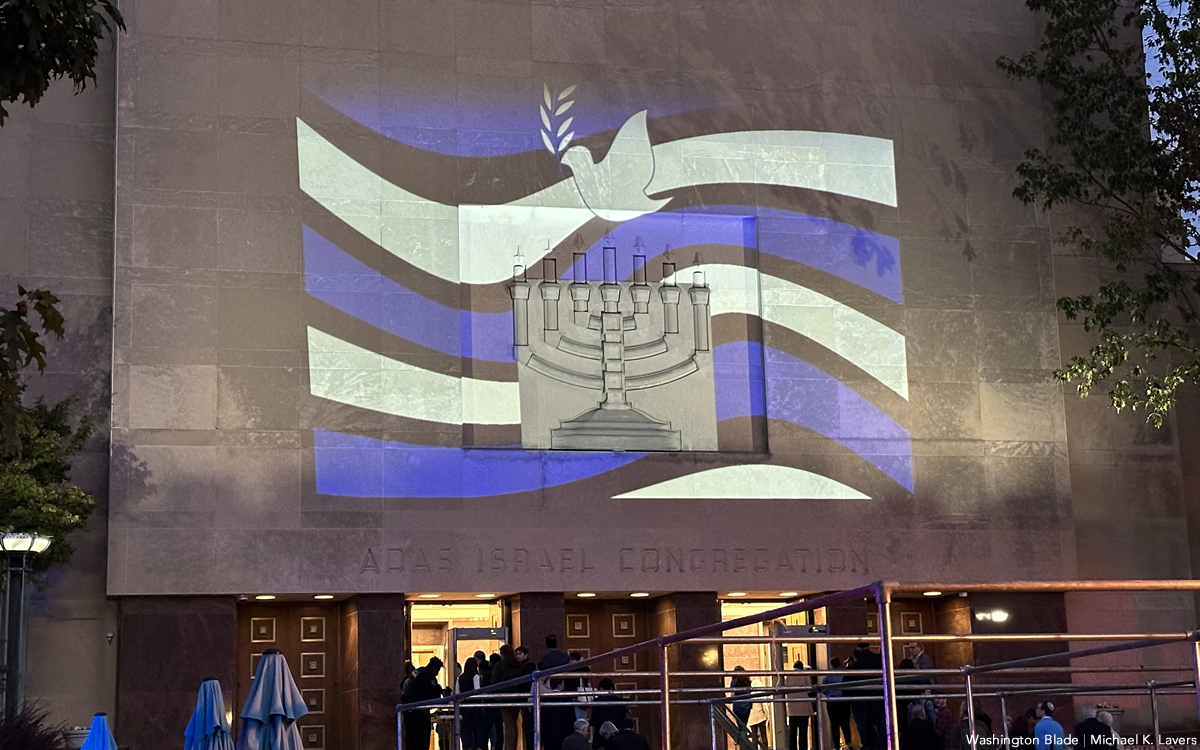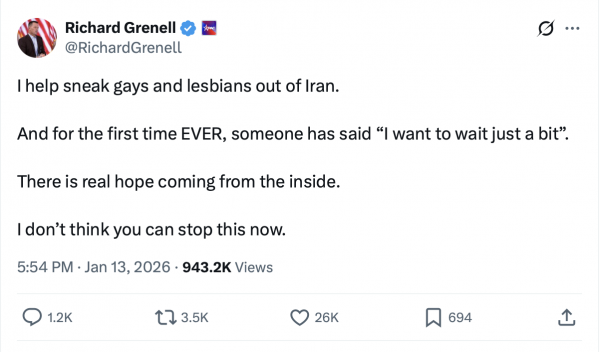Middle East
LGBTQ groups in Israel respond to war
Hamas militants launched surprise attack on Saturday

LGBTQ rights groups in Israel have rallied to support to those who have been impacted by their country’s war against Hamas that began Saturday.
Hila Peer, chair of the Aguda, the Association for LGBTQ Equality in Israel, on Monday said her organization and other Israeli LGBTQ rights groups have launched an “operation to take in people” who have been evacuated from communities in southern Israel that are near the Gaza Strip. The Aguda has also encouraged anyone to reach out if they want to donate food or equipment to members of the Israel Defense Forces or offer “a listening ear.”
“We are here for each other,” reads a post to the Aguda’s Facebook page. “Let’s not go through this alone.”
“We’re keeping safe, trying to do everything we can to help our friends in reserves right now and people in active service,” Peer told the Washington Blade.
Hoshen, an advocacy group that works in secular Israeli schools, on its website also encouraged its members to donate food and equipment and host evacuees from southern Israel. Hoshen, like the Aguda, has also pledged to help Israelis who the war has directly impacted.
“Our role as a community is to stand together, hand in hand and heart to heart, to help, assist, support and encourage them,” said Hoshen.
Maya Arbel, executive director of Ma’avarim, a transgender rights group, on Tuesday said she and her colleagues are cooking meals for IDF soldiers and collecting donations.
“[During] these times, it’s crucial for the transgender community in Israel to be part of Israeli society and contribute to civic efforts, fostering a sense of unity with the hope and goal of coming together and improving our situation during this crisis,” Arbel told the Blade.
Arbel said Ma’avarim is also working to ensure trans people continue to have access to health care and other basic needs during the war.
“The transgender community in emergency situations are especially vulnerable, as not every space is accommodating to transgender identities, and those who rely on medical resources may be marginalized due to the emergency situation,” said Arbel. “These days of chaos emphasize the importance of preparedness and know-how for aid and calmness.”
A Wider Bridge — a U.S.-based organization that seeks to build “a movement of LGBTQ people and allies with a strong interest in and commitment to supporting Israel and its LGBTQ communities” — is accepting donations on its website that it will send to Israeli advocacy groups.

Hamas, which the U.S. and Israel have designated a terrorist organization, on Saturday launched a surprise attack against communities in southern Israel from Gaza.
The Israeli government has said more than 1,200 people have been killed, including at least 260 people who Hamas militants murdered at an all-night music festival in a kibbutz near the border between Israel and Gaza. The Israeli government also says more than 3,000 people have been injured in the country since the war began and Hamas militants kidnapped at least 150 others.
Hamas rockets have reached Tel Aviv, Jerusalem, Ben Gurion Airport and other locations in central and southern Israel. The AP reports IDF forces and Hezbollah, another militant group, have exchanged fire across the Israeli-Lebanese border.
The Palestinian Health Ministry on its website says Israeli airstrikes in Gaza have killed 1,055 people and injured 5,184 others. The Israeli government has cut electricity and water to the territory and has stopped food and fuel shipments.
“As a community, we stand with the people of Israel and condemn those who choose terror and torture over peace,” said Congregation Bet Mishpachah, an LGBTQ synagogue in D.C., on Tuesday in a statement sent to the Blade. “For many, Israel not only represents the homeland of the Jewish people, but also stands out as a beacon of freedom, hope and acceptance for LGBTQ+ Jews and non-Jews alike in the Middle East and around the world.”
Rabbi Jake Singer-Beilin joined D.C. Mayor Muriel Bowser and Eliav Benjamin, the deputy chief of mission for the Israeli Embassy in Washington, among thousands of others, at a prayer vigil that took place at Adas Israel Congregation in Northwest D.C. on Tuesday.
“We recognize the necessity for the people and State of Israel’s right to defend themselves against groups who wish to take away those freedoms and seek the total annihilation of the Jewish people,” said Bet Mishpachah in its statement. “Our hearts mourn the loss of innocent lives in Gaza as well.”

HRC president: ‘Loss of life unfolding in the Middle East is heartbreaking’
Human Rights Campaign President Kelley Robinson is among those outside of Israel who have publicly responded to the war.
“The loss of life unfolding in the Middle East is heartbreaking and the human rights violations are appalling,” she said on Monday in a thread on her X account.
“Hamas killed hundreds of Israeli civilians over the weekend in a terrorist attack,” added Robinson. “And now countless more Palestinian and Israeli people are dying as the violence escalates while Jewish, Arab and Muslim people in the U.S. and around the world fear backlash and hate-motivated crimes.”
West Hollywood (Calif.) Mayor Sepi Shyne, a lesbian woman who was born in Iran, on Saturday condemned “the attacks by Hamas and the terror groups from Gaza on Israel and her people” and stressed the U.S. “stands with the people of Israel as they once again bravely face horrific violence.”
“As someone who has experienced this kind of terror and violence, these actions never lead to peace and my heart goes out to both the Israeli and Palestinian civilians caught in this horrible conflict,” she added in her statement. “Israel has the right to defend itself and this violence must be universally condemned.”
Georges Azzi, co-founder of Helem, a Lebanese LGBTQ rights group, on Monday used the hashtag #IStandWithHumanity in his own tweet.
“You can support Palestinians and their right to end occupation and not support Hamas, you can advocate for Palestinian rights without endorsing Hezbollah,” said Azzi. “You can condemn terrorism and the killing of civilians and still believe in one’s right to resist. These stances are not mutually exclusive.”
Hasan Kilani, a Jordanian Palestinian queer activist, on Wednesday expressed concern about LGBTQ people who cannot leave Gaza.
“There is no exit for LGBTQ individuals from Gaza to leave as Israel bombed all exits for Gazans,” Kilani told the Blade. “Israel must allow those who want to escape the bombing to do so. That’s the minimum we can ask.”

Advocacy groups are demanding the Trump-Vance administration not to deport two gay men to Iran.
MS Now on Jan. 23 reported the two men are among the 40 Iranian nationals who the White House plans to deport.
Iran is among the countries in which consensual same-sex sexual relations remain punishable by death.
The Washington Blade earlier this month reported LGBTQ Iranians have joined anti-government protests that broke out across the country on Dec. 28. Human rights groups say the Iranian government has killed thousands of people since the demonstrations began.
Rebekah Wolf of the American Immigration Council, which represents the two men, told MS Now her clients were scheduled to be on a deportation flight on Jan. 25. A Human Rights Campaign spokesperson on Tuesday told the Blade that one of the men “was able to obtain a temporary stay of removal from the” 10th U.S. Circuit Court of Appeals, and the other “is facing delayed deportation as the result of a measles outbreak at the facility where they’re being held.”
“My (organization, the American Immigration Council) represents those two gay men,” said American Immigration Council Senior Fellow Aaron Reichlin-Melnick in a Jan. 23 post on his Bluesky account. “They had been arrested on charges of sodomy by Iranian moral police, and fled the country seeking asylum. They face the death penalty if returned, yet the Trump (administration) denied their asylum claims in a kangaroo court process.”
“They are terrified,” added Reichlin-Melnick.
My org @immcouncil.org represents those two gay men. They had been arrested on charges of sodomy by Iranian moral police, and fled the country seeking asylum. They face the death penalty if returned, yet the Trump admin denied their asylum claims in a kangaroo court process.
They are terrified.
— Aaron Reichlin-Melnick (@reichlinmelnick.bsky.social) January 23, 2026 at 8:26 AM
Reichlin-Melnick in a second Bluesky post said “deporting people to Iran right now, as body bags line the street, is an immoral, inhumane, and unjust act.”
“That ICE is still considering carrying out the flight this weekend is a sign of an agency and an administration totally divorced from basic human rights,” he added.
Deporting people to Iran right now, as body bags line the street, is an immoral, inhumane, and unjust act. That ICE is still considering carrying out the flight this weekend is a sign of an agency and an administration totally divorced from basic human rights. www.ms.now/news/trump-d…
— Aaron Reichlin-Melnick (@reichlinmelnick.bsky.social) January 23, 2026 at 8:27 AM
HRC Vice President of Government Affairs David Stacy in a statement to the Blade noted Iran “is one of 12 nations that still execute queer people, and we continue to fear for their safety.” Stacy also referenced Renee Good, a 37-year-old lesbian woman who a U.S. Immigration and Customs Enforcement agent shot and killed in Minneapolis on Jan. 7, and Andry Hernández Romero, a gay Venezuelan asylum seeker who the Trump-Vance administration “forcibly disappeared” to El Salvador last year.
“This out-of-control administration continues to target immigrants and terrorize our communities,” said Stacy. “That same cruelty murdered Renee Nicole Good and imprisoned Andry Hernández Romero. We stand with the American Immigration Council and demand that these men receive the due process they deserve. Congress must refuse to fund this outrage and stand against the administration’s shameless dismissal of our constitutional rights.”
Iran
LGBTQ Iranians join anti-government protests
Nationwide demonstrations over economy began Dec. 28

Protests erupted across Iran on Dec. 28 as public anger over the country’s collapsing country spilled into the streets. Members of the LGBTQ community are among those who have participated in them.
What began as demonstrations over rising living costs soon expanded into broader political dissent, with protesters chanting anti-government slogans and, in some cases, directly criticizing Supreme Leader Ayatollah Ali Khamenei. Authorities later imposed internet restrictions and launched a nationwide crackdown, according to human rights groups.
According to Reuters, an Iranian official said authorities have verified at least 5,000 deaths linked to the unrest, including about 500 members of the security forces. The official blamed what the government described as “terrorists and armed rioters” for the killings, a characterization that could not be independently verified due to severe restrictions on media access and internet connectivity.
The same official told Reuters that the final death toll was not expected to rise significantly. The official also alleged that Israel and armed groups outside Iran had supported and supplied those involved in the protests, claims that could not be independently verified.
Multiple sources told the Washington Blade that LGBTQ Iranians have taken part in the protests against the government, despite the heightened risks they face under the country’s strict laws that criminalize consensual same-sex sexual relations.
Arsham Parsi, founder and executive director of International Railroad for Queer Refugees, is from Shiraz, a city in southern Iran. He fled the country in 2005.
Parsi told the Blade a widespread demand for dignity and freedom is driving the uprising.
“It is important to say clearly: LGBTQ people are part of Iranian society, and they are part of this protest,” said Parsi. “Many are participating directly, despite facing risks that are often even greater than others — because in Iran they are already criminalized and targeted simply for who they are.”
“For LGBTQ Iranians, showing up — whether publicly or in underground ways — can carry life-and-death consequences,” he added.
Parsi told the Blade that members of the LGBTQ community with whom he has been in contact described a mix of fear, exhaustion, grief, and determination. He added that many of them feel this moment differs from previous waves of protest in Iran.
“The scope, the persistence, and the public rejection of fear feel qualitatively different — and for that reason, many Iranians inside and outside the country are hopeful that this will lead to real transformation, including regime change, and that Iranians will finally regain their freedom,” said Parsi. “Freedom is not free, and Iranians are paying its cost with their blood.”
Parsi said the government’s response to the protests has been severe; citing widespread blackouts, internet shutdowns, telephone disruptions, and heavy security presence on the streets. He said the communication restrictions have made it increasingly difficult to document abuses, locate missing people, coordinate medical assistance or verify information, warning that such conditions can allow violence to occur beyond public view.
Parsi said his organization, along with other trusted groups, has been sharing harm-reduction guidance whenever possible, particularly on digital safety, avoiding identification and minimizing risk. He added, however, there is no fully safe way to protest under a system that criminalizes identity and treats dissent as an enemy, noting LGBTQ people, women, students, labor activists, and ethnic and religious minorities are among those facing the greatest danger.
“I also want to be very clear about what kind of international involvement we are calling for. We are against foreign military intervention. Iranians must determine Iran’s future. But we do need international aid and serious diplomatic engagement that is grounded in human rights — not convenience,” said Parsi. “In the past, too often, when Iranians rose up, parts of the international community were distracted by negotiations, ‘promises’ from the Islamic Republic, or short-term deals, and the momentum for human rights was abandoned.”
“We hope this time no one is fooled,” he added. “The regime is desperately trying to manipulate the narrative through state media and misinformation — to change the course of events and confuse the international community. The world must be smart, vigilant, and principled: do not reward repression with legitimacy, and do not trade away Iranian rights for empty assurances.”
Parsi said the unrest should also be viewed within a broader regional context, noting Iran’s actions beyond its borders have long drawn criticism from governments and analysts who accuse the country of supporting armed groups and contributing to conflicts that have harmed civilians across the Middle East. He said a future Iran that respects human rights domestically and pursues less confrontational policies abroad could have implications not only for Iranians, but for regional and global stability as well, adding many within the country continue to protest despite the personal risks involved.
Soudeh Rad, co-founder and executive director of Spectrum, a France-based NGO that works with Farsi-speaking communities on gender equality and LGBTQ issues, noted to the Blade the latest wave of large-scale protests began in Tehran’s Grand Bazaar. They said LGBTQ people, like other marginalized and underrepresented communities, often suffer disproportionate burden under systems of entrenched discrimination.
“Images and testimonials prove the fact that protestors are from all classes, ages, communities, ethnicities, genders, and even with different abilities. This is not a higher-class protest. Obviously, our LGBTQIA+ siblings, of all political tendencies and belongings,” said Rad. “As we can imagine, if their SOGIESC (sexual orientation, gender identity, gender expression, and sex characteristics) identity is revealed at the detention centers and prisons, they will be subject to a higher and more intense torture. Police and militia have not hesitated a moment to shoot protestors to kill them. Snipers have been spotted targeting people. Reported numbers of killed and injured people go as high as thousands.”
Rad said recent protest movements have produced gradual social changes in Iran even without formal legal reforms. They cited the “Women, Life, Freedom” movement, noting observers report growing noncompliance with compulsory hijab rules and increased solidarity among ethnic and long-marginalized communities that include Baluchis, Kurds, and Azeris. Rad described the current unrest as part of an ongoing process of social transformation.
Shadi Amin, a director at the LGBTQ rights group 6Rang, said the full impact of the crackdown on LGBTQ activists remains unknown, citing internet shutdowns and limited access to detention centers that have hindered documentation. She said LGBTQ people often face additional barriers to recognition as victims of human rights abuses, because discussions of sexual orientation and gender identity are frequently sidelined during periods of unrest. This omission leaves many cases unacknowledged or erased from public narratives.
Amin also pointed to Iran’s legal framework, under which consensual same-sex sexual relations remain punishable by death, as a key factor contributing to the long-standing invisibility of LGBTQ people.
She said the absence of official data makes it impossible to determine how many LGBTQ individuals may have been killed, detained or subjected to abuse during the protests, adding that this lack of recognition has persisted for decades. Amin told the Blade the internet shutdown has also severed regular communication between advocacy groups and LGBTQ people inside Iran, cutting off counseling services and daily contact that had previously provided limited insight into conditions on the ground. She said the loss of communication has made it increasingly difficult to assess the safety of individuals or confirm who remains in detention or has gone missing.
“I have spent almost my entire life fighting for freedom and democracy. Even if we have not yet achieved our ultimate goal, we have made life harder for our oppressors and safer for our community—and that in itself matters,” Amin noted to the Blade. “We seek change and have called for international intervention to uphold the responsibility to stop crimes against humanity, including through Responsibility to Protect (a U.N. principle adopted in 2005); however, top-down regime change or foreign military intervention would silence the movement.”
“In times of war, weapons — not people — have the final word, and social movements are pushed aside. This is one of our core concerns,” she added. “Another is the risk that even if the current regime is overthrown, it could be replaced by another form of dictatorship — such as a monarchic project represented by the son of the former shah, who has lived in the United States for nearly five decades and lacks democratic legitimacy.”
Amin said LGBTQ activists fear being overlooked amid the broader unrest, emphasizing concerns that ongoing repression and communication blackouts risk pushing LGBTQ experiences further out of public view. She said maintaining international attention remains critical for communities that are often forced into invisibility during periods of crisis.
Matt Forouzandy, president of the 30-Morg Queer Liberation Committee, an NGO focused on LGBTQ issues affecting Iranians inside the country and in the diaspora, confirmed LGBTQ Iranians have participated in the protests since they began.
He said some queer Iranians publicly expressed support for Crown Prince Reza Pahlavi on social media, sharing posts alongside Iran’s lion and sun flag, while acknowledging the risks they faced before joining demonstrations.
Pahlavi is the son of Iran’s last monarch, Mohammad Reza Shah Pahlavi, who was overthrown during the 1979 Islamic Revolution. Living in exile, he has in recent years emerged as a symbolic opposition figure for some Iranians abroad, though his role and influence inside the country remain contested.
Forouzandy said LGBTQ people inside Iran have, in some cases, participated more openly in the protests than many observers might expect, citing years of compounded repression under the regime. He said many queer activists use their real names and photographs on X and other social media platforms, rather than operating anonymously. Forouzandy added LGBTQ participants across different regions of the country have publicly expressed opposition to the current system.
Forouzandy said the future legal and civil status of LGBTQ people in Iran would depend on the political direction taken if the current system were to change, including whether outcomes reflect domestic demands or outside influence. He said some protesters have expressed support for a return to monarchical rule, arguing that such a shift could affect prospects for civil rights, though the outcome remains uncertain.
“Iranians in the diaspora — including LGBTQ+ individuals — are doing everything within their capacity to support those inside the country,” said Forouzandy. “However, the most decisive force remains the people inside Iran themselves. Their courage, determination, and collective will are what ultimately shape the outcome.”
“This is especially true for LGBTQ+ Iranians, who are fighting simultaneously for the liberation of their homeland and for full and equal civil rights within a future free Iran,” he added.
Iran
Grenell: ‘Real hope’ for gay rights in Iran as result of nationwide protests
Former ambassador to Germany claimed he has sneaked ‘gays and lesbians out of’ country

Richard Grenell, the presidential envoy for special missions of the United States, said on X on Tuesday that he has helped “sneak gays and lesbians out of Iran” and is seeing a change in attitudes in the country.
The post, which now has more than 25,000 likes since its uploading, claims that attitudes toward gays and lesbians are shifting amid massive economic protests across the country.
“For the first time EVER, someone has said ‘I want to wait just a bit,” the former U.S. ambassador to Germany wrote. “There is real hope coming from the inside. I don’t think you can stop this now.”

Grenell has been a longtime supporter of the president.
“Richard Grenell is a fabulous person, A STAR,” Trump posted on Truth Social days before his official appointment to the ambassador role. “He will be someplace, high up! DJT”
Iran, which is experiencing demonstrations across all 31 provinces of the country — including in Tehran, the capital — started as a result of a financial crisis causing the collapse of its national currency. Time magazine credits this uprising after the U.N. re-imposed sanctions in September over the country’s pursuit of nuclear weapons.
As basic necessities like bread, rice, meat, and medical supplies become increasingly unaffordable to the majority of the more than 90 million people living there, citizens took to the streets to push back against Iran’s theocratic regime.
Grenell, who was made president and executive director of the John F. Kennedy Center for the Performing Arts last year by Trump, believes that people in the majority Shiite Muslim country are also beginning to protest human rights abuses.
Iran is among only a handful of countries in which consensual same-sex sexual relations remain punishable by death, according to the Death Penalty Information Center.


















